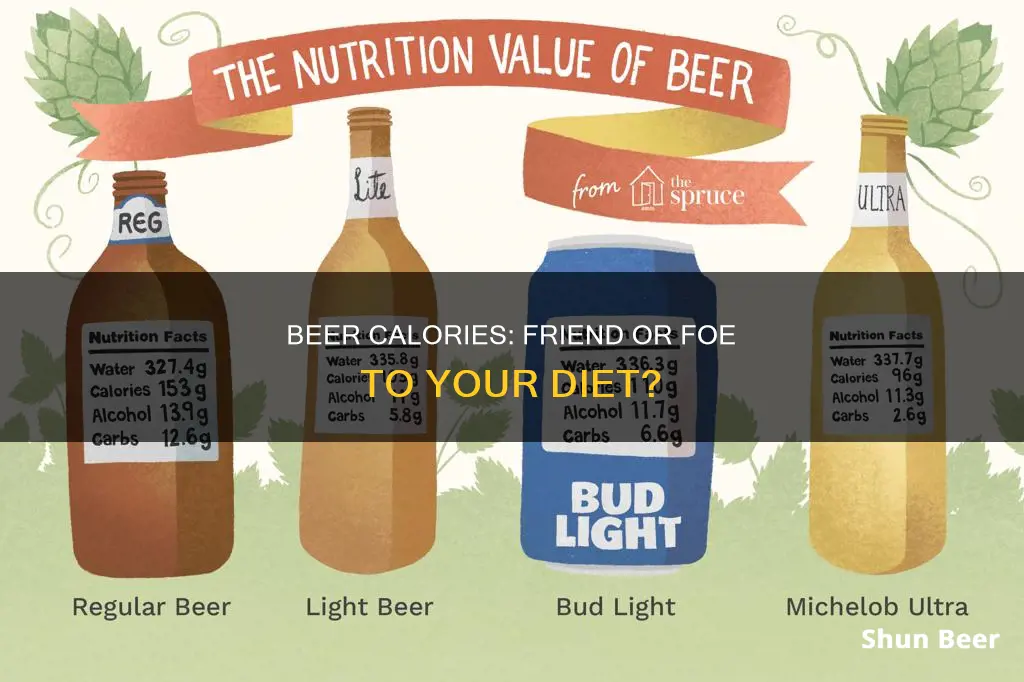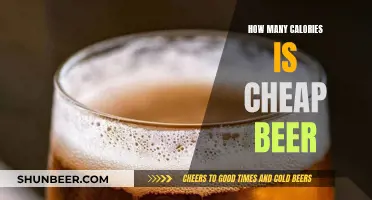
Beer calories are a tricky topic. While beer does contain calories, the way our body metabolises these calories is different from how it processes calories from food.
Beer calories come mainly from alcohol and additional carbohydrates. One gram of alcohol contains about seven calories, while carbohydrates and proteins contain four calories per gram, and fat contains nine calories per gram.
However, the body metabolises alcohol differently from food. Alcohol is considered a toxin by the body, which works to break it down and excrete it. This process can slow down the burning of body fat for energy. Additionally, the metabolites of alcohol can increase thermogenesis, or heat production by the body, which can lead to a positive fat balance, with alcohol-related fat deposition in the abdominal area, resulting in the well-known beer belly.
Furthermore, alcohol can affect our appetite and food choices. It impairs the prefrontal cortex, leading to decreased inhibitions and potentially causing us to make less healthy food choices.
So, while beer calories are technically the same as food calories in terms of energy content, the way our body processes these calories and the overall impact on our body composition and weight can be quite different.
| Characteristics | Values |
|---|---|
| Calories in beer | Vary depending on alcohol content and additional carbohydrates |
| Calories in food | Carbohydrates and proteins contain 4 calories per gram, fat contains 9 calories per gram |
| Calories in alcohol | 7 calories per gram |
| Beer vs food calories | Beer calories are not the same as food calories |
| Beer calories vs alcohol calories | Beer calories are not the same as alcohol calories |
What You'll Learn

Beer calories are not the same as food calories
Firstly, alcohol is considered a toxin by the body. As a result, the body has specific enzymes designed to break it down and actively works to excrete it. This means that the body can't store calories from alcohol for later, as it does with food calories. Instead, when you drink, your metabolic system must stop what it's doing to get rid of the alcohol. This means that whatever you recently ate gets stored as fat instead.
Secondly, alcohol has around seven calories per gram, which is higher than the four calories per gram of protein and carbohydrates, but lower than the nine calories per gram of fat.
Thirdly, alcohol can alter your body's ability to process glucose, slow down the burning of the body's own fat for energy, and increase thermogenesis (the heat produced by the body through metabolic processes).
Finally, alcohol is an appetite stimulant, making you more likely to overeat.
In conclusion, while beer does contain calories, the way the body processes these calories and the additional effects of alcohol on the body mean that beer calories are not the same as food calories.
Calories in Beer: Average Count and Health Facts
You may want to see also

Alcohol calories are empty calories
Alcohol calories are often referred to as "empty calories". This means that they provide energy, but have no additional nutritional value. Alcohol is not a carbohydrate, fat, or protein, and provides none of the benefits of these other macros.
Alcohol is a toxin, and the body treats it as such, working to rid itself of the substance. This process can prevent other important functions, such as growth, repair, and hormonal regulation. While your body is working to remove the alcohol, it is also interrupted in its other processes, such as absorbing nutrients and processing fat. This is why alcohol calories are considered "empty".
Alcohol calories are also referred to as empty because they are usually additional to the calories consumed in food throughout the day, rather than a replacement. This can lead to weight gain, and an unhealthy diet. Alcohol also negatively affects the hormones that control your appetite, often leading to increased junk food consumption.
Alcoholic drinks are also often high in sugar, which can further contribute to weight gain and an unhealthy diet. Sugar can also alter behaviour, reducing the consumption of foods that contain essential nutrients. A diet high in alcohol can lead to a deficiency in zinc, vitamin D, thiamine, folate, cyanocobalamin, and selenium.
In summary, alcohol calories are considered empty because they provide no nutritional benefits, and can interrupt the body's other processes of absorbing nutrients and burning fat. They can also contribute to weight gain, and a generally unhealthy diet.
Calories in Blue Moon's Pumpkin Beer: A Healthy Treat?
You may want to see also

Alcohol calories are harder to burn
Alcohol contains seven calories per gram, which is more than carbohydrates but lower than fat. However, research suggests that the body only extracts 70-80% of these calories due to thermogenesis, resulting in approximately 5 to 6 calories per gram of alcohol being utilised.
The process of metabolising alcohol occurs primarily in the liver and kidneys, rather than in the intestines where normal digestion takes place. This shift in metabolic pathways can cause a decrease in fat burning for 12 to 36 hours, depending on the amount of alcohol consumed and individual factors. As a result, the calories from alcohol are preferentially converted into fat, particularly in the abdominal area, leading to a "beer belly".
Additionally, alcohol can increase thermogenesis more than other foods, further impacting weight gain. However, this effect is reduced in overweight individuals or when paired with a high-fat diet.
It's worth noting that the relationship between alcohol consumption and weight gain is complex and the findings of studies are inconclusive. While alcohol may contribute to weight gain, other factors such as diet, overall health, and drinking habits also play a role.
Calories in Nonalcoholic Beer: What's the Count?
You may want to see also

Alcohol affects your body's ability to burn fat
The body considers ethanol, the organic compound produced during fermentation, as a toxin or waste product. As a result, it will shut down all other metabolic pathways until the alcohol is eliminated from the system, which can take up to 36 hours. During this time, the body's ability to burn fat is significantly hindered.
Alcohol also affects the liver, which plays a crucial role in metabolising fats, carbohydrates, and proteins. Excessive alcohol consumption can lead to alcoholic fatty liver, a condition that damages the liver and impairs its ability to metabolise and store carbohydrates and fats properly. This disruption in energy storage can make it challenging to lose weight.
Additionally, alcohol can trigger hunger signals in the brain, leading to an increased urge to eat more food. It can also negatively impact sleep, causing increased periods of wakefulness during sleep cycles. Sleep deprivation can then lead to an imbalance in hormones related to hunger, satiety, and energy storage, further affecting the body's ability to burn fat.
While the relationship between alcohol consumption and weight gain is complex and depends on various factors, reducing alcohol intake can support weight loss efforts by minimising the impact on fat-burning processes and overall energy balance.
Rolling Rock Extra Pale Beer: Calorie Count and Nutrition
You may want to see also

Alcohol has more calories per gram than carbs
Alcohol has more calories per gram than carbohydrates. One gram of alcohol contains about seven calories, while carbohydrates and proteins contain four calories per gram. This means that a measly 1.5-ounce jigger of vodka has almost 100 calories.
However, the body does not efficiently digest alcohol in the same way it does food. Alcohol is a toxin, and our bodies work to actively excrete it. As a result, we derive far less than the theoretical maximum of seven calories per gram from alcohol.
When we consume alcohol more rapidly than it can be broken down, interim metabolites remain in the body, leading to feelings of inebriation. The metabolites of alcohol can also slow down the burning of the body's own fat for energy, as alcohol gets preferential treatment in the metabolic process. This can result in a positive fat balance, with alcohol-related fat deposited in the abdominal area, leading to the well-known 'beer belly'.
Additionally, alcohol increases thermogenesis more than other foods, raising the body temperature. This effect is lessened in overweight individuals or when paired with a high-fat diet.
While alcohol has more calories per gram than carbs, the body's complex and inefficient metabolic process for dealing with alcohol means that the overall caloric intake from alcohol is less than the sum of its parts.
Calorie Counting: Duet Beer's Surprising Number
You may want to see also
Frequently asked questions
Beer calories are not the same as food calories. Beer calories tend to be stored as fat rather than burned as energy. Beer calories are also higher than carbohydrates but lower than fat calories.
Yes, drinking beer can make you gain weight. Alcohol can add hundreds of calories to your diet and can also slow down the burning of the body's own fat for energy.
The alcoholic content of beer is about 5% by volume, which translates to about seven calories per gram of alcohol.
Yes, there are differences in the calorie content of different types of beer. For example, a whole pint of dark beer is around 170 calories, while the same amount of regular beer is about 195 calories.







